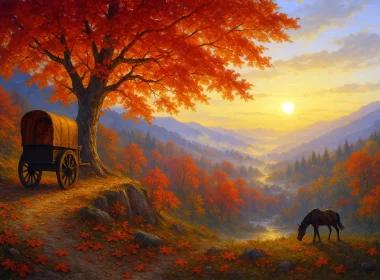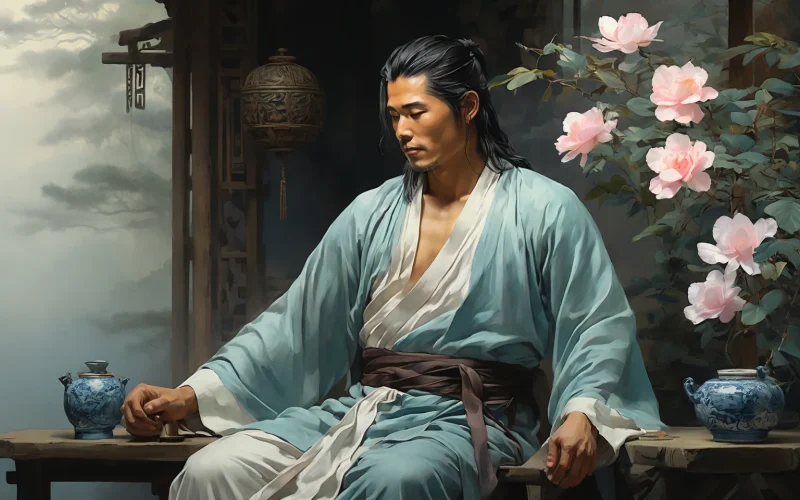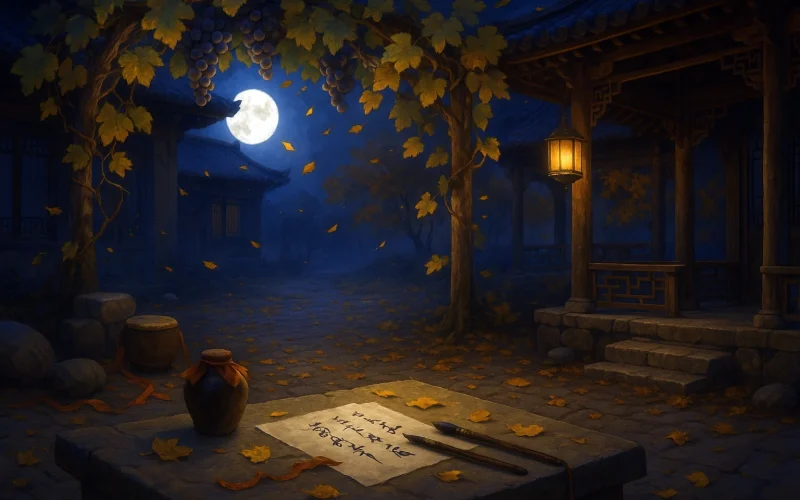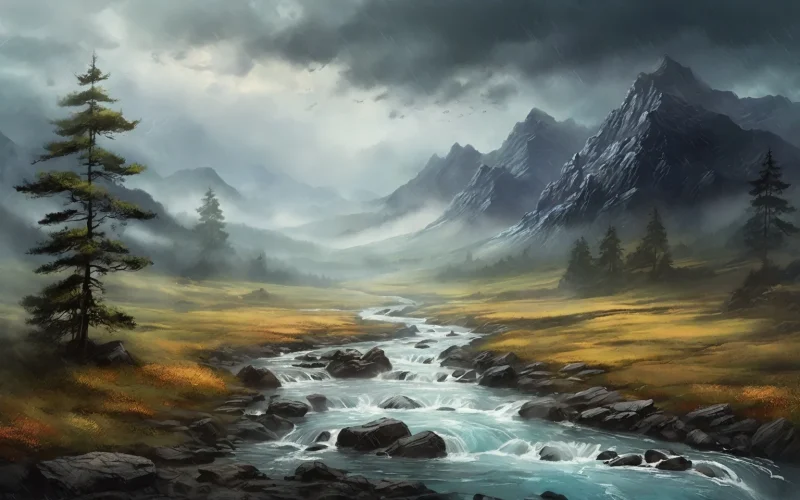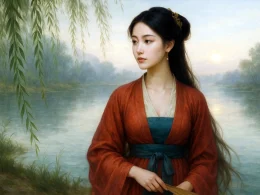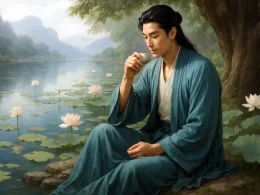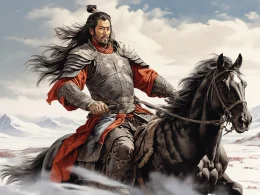Woods wrapped in morning mist, chill dawn awakes,
Wild gardenias bloom—their scent spreads wide.
How blest to see worldly affairs fade away,
How strange old age makes passions magnified!
Three cups of winter ale float emerald hue,
One scroll of spring verse smoothed on pale gold.
Why not cast off all mortal constraints,
And beg rivers and lakes to drown me bold?
Original Poem
「放翁坐上」
刘过
林雾霏霏晓意凉,野栀才放已传香。
幸哉世事日相远,怪底时情老更狂。
腊蚁三杯浮重碧,春膏一幅砑轻黄。
何如放浪形骸外,尽乞江湖作醉乡。
Interpretation
Composed during the late Southern Song Dynasty when national strength waned, this poem reflects Liu Guo's profound concern for state affairs and personal frustrations over unfulfilled ambitions. The title's "Fang Weng" refers to Xin Qiji, whom Liu deeply admired and frequently visited. Written during a drinking gathering where they discussed worldly matters, the poem expresses Liu's appreciation for his friend's ideals while voicing his own weariness with fame and fortune, instead yearning for a free, unrestrained life amidst rivers and lakes.
The poem intricately depicts morning landscapes, laments the passage of time and worldly sentiments, and ultimately advocates retreating to nature in pursuit of spiritual freedom—embodying Southern Song scholars' aspirations for ideal character and liberated living amid turbulent times.
First Couplet: "林雾霏霏晓意凉,野栀才放已传香。"
Lín wù fēi fēi xiǎo yì liáng, yě zhī cái fàng yǐ chuán xiāng.
Forest mist drifts thick,
morning chill pervades—
wild gardenias bloom,
their fragrance already spreading.
The opening couplet paints a tranquil morning scene, employing sensory imagery—"mist," "chill," and "fragrance"—to evoke serenity. "Drifting thick" (霏霏) captures the mist's delicate density, while "wild gardenias" (野栀) symbolize untamed beauty, their swift fragrance suggesting nature's effortless grace and hinting at the poet's longing for simplicity.
Second Couplet: "幸哉世事日相远,怪底时情老更狂。"
Xìng zāi shì shì rì xiāng yuǎn, guài dǐ shí qíng lǎo gèng kuáng.
How fortunate—daily affairs
grow ever more distant!
How strange—worldly passions
grow wilder with age!
Transitioning to introspection, these lines celebrate the poet's retreat from worldly chaos while critiquing society's escalating decadence. "How fortunate" (幸哉) conveys heartfelt relief, whereas "How strange" (怪底) underscores disdain for aging yet increasingly unrestrained desires.
Third Couplet: "腊蚁三杯浮重碧,春膏一幅砑轻黄。"
Là yǐ sān bēi fú zhòng bì, chūn gāo yī fú yà qīng huáng.
Winter ants, three cups drunk,
float heavy as jade;
spring oil, one sheet pressed,
grows lightly translucent.
Here, striking metaphors unfold. "Winter ants" (腊蚁), weighed down by wine, symbolize the poet's burdens in a harsh reality. In contrast, "spring oil" (春膏), thin and luminous after pressing, represents an ideal state of mental clarity and liberation. The juxtaposition highlights his yearning to shed worldly heaviness for lightness and freedom.
Fourth Couplet: "何如放浪形骸外,尽乞江湖作醉乡。"
Hé rú fàng làng xíng hái wài, jìn qǐ jiāng hú zuò zuì xiāng.
Why not cast off all restraints
and beg rivers and lakes
to become my drunken paradise?
The finale articulates the poet's ultimate desire. "Cast off all restraints" (放浪形骸外) echoes Zhuangzi's philosophy, advocating total freedom from societal norms. "Drunken paradise" (醉乡) elevates rivers and lakes into a spiritual sanctuary, revealing his resolve to embrace reclusion and unrestrained living.
Holistic Appreciation
The poem begins with a serene morning scene, transitions into reflections on worldly detachment, and culminates in a vision of spiritual liberation. "Forest mist" and "wild gardenias" establish tranquility, while "distant affairs" and "wild passions" critique societal decay. The "winter ants" and "spring oil" contrast life's heaviness with desired lightness, leading to the climactic plea for unrestrained freedom in nature's embrace.
With concise language and profound imagery, the poem blends natural beauty, personal sentiment, and philosophical depth, showcasing Liu Guo's emotional resilience and transcendent spirit as a patriotic scholar navigating an unstable world.
Artistic Features
- Scene-Emotion Fusion
Opening with forest mist, the poem seamlessly merges external nature with internal reflection. - Unique Metaphors
"Winter ants" and "spring oil" are vivid, philosophically rich symbols. - Crisp Rhythm, Concise Language
The seven-character regulated verse is structurally polished, with succinct yet profound diction. - Transcendent Idealism
The poem radiates a yearning to transcend worldly chaos, blending Confucian and Daoist thought into a vision of personal freedom. - Layered Progression
Moving from nature to human life, reality to idealism, the poem builds tension through sequential imagery.
Insights
This work reminds us to seek tranquility and spiritual freedom amid life's turbulence. Faced with societal noise and浮躁, we might follow the poet's example: retreat to nature, reconnect with our essence, and shed功利 constraints to embrace inner peace.
As the poem concludes, "beg rivers and lakes to become my drunken paradise" (尽乞江湖作醉乡)—true clarity and洒脱 emerge not from obsessing over gain and loss but from understanding and transcending the self. Let the heart's calm be life's ultimate refuge.
About the Poet
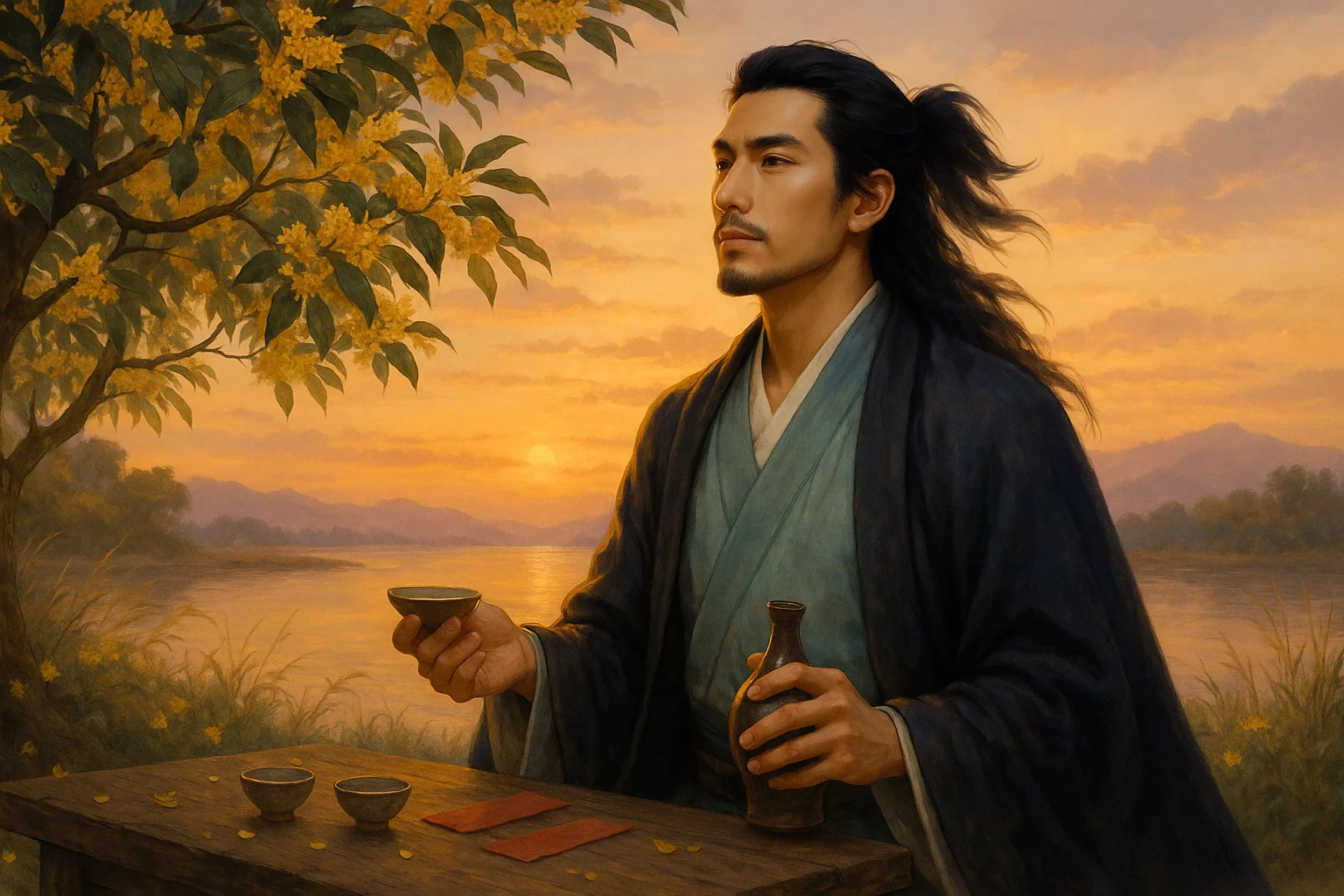
Liu Guo (刘过 1154 - 1206), a native of Taihe in Jiangxi, was a ci poet of the Bold and Unconstrained School (haofang pai) during the Southern Song Dynasty. Though he remained a commoner all his life, wandering the rivers and lakes, he associated with literary giants like Lu You and Xin Qiji. His ci poetry is impassioned and heroic, and his verse is vigorous and forceful. Stylistically close to Xin Qiji but even more unrestrained, Liu Guo became a central figure among Xin’s poetic followers.





